Report on Counselling: Theory, Skills, and Cultural Identity Impact
VerifiedAdded on 2023/01/13
|9
|3208
|1
Report
AI Summary
This report provides a comprehensive overview of counselling practices, focusing on the application of theories, the development of essential skills, and the influence of cultural identity. The introduction defines counselling and its impact on individuals, setting the stage for a detailed exploration of cognitive behavioral therapy (CBT). The main body critically evaluates the application of CBT, highlighting its benefits and drawbacks. It then delves into the crucial listening and responding skills necessary for effective counselling, including active listening and appropriate questioning. Finally, the report examines how cultural identity shapes counselling approaches, emphasizing the importance of understanding a client's background for tailored treatment. The report concludes by summarizing the key findings and emphasizing the importance of continuous learning and adaptation in the field of counselling.

Assessment
1
1
Paraphrase This Document
Need a fresh take? Get an instant paraphrase of this document with our AI Paraphraser
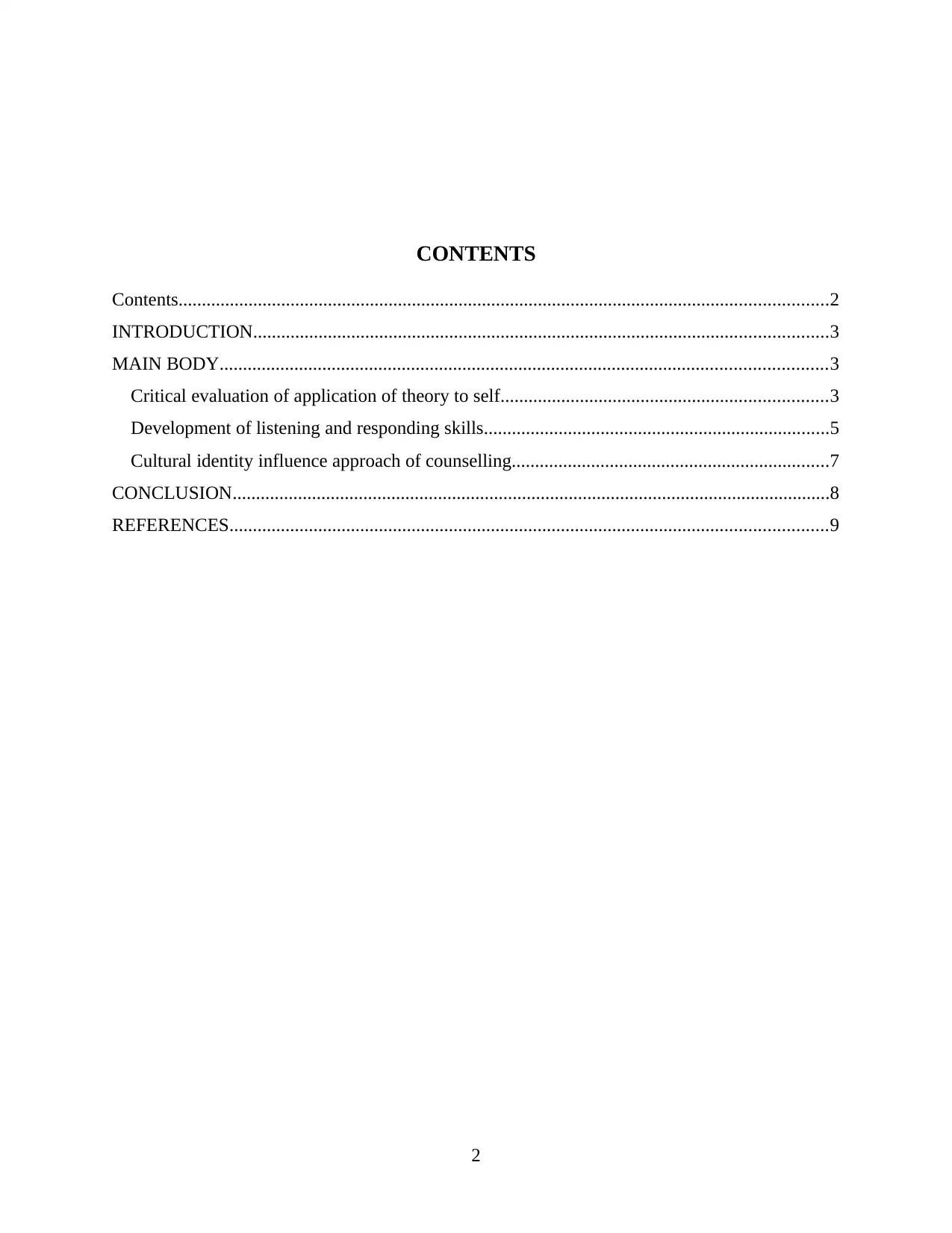
CONTENTS
Contents...........................................................................................................................................2
INTRODUCTION...........................................................................................................................3
MAIN BODY..................................................................................................................................3
Critical evaluation of application of theory to self......................................................................3
Development of listening and responding skills..........................................................................5
Cultural identity influence approach of counselling....................................................................7
CONCLUSION................................................................................................................................8
REFERENCES................................................................................................................................9
2
Contents...........................................................................................................................................2
INTRODUCTION...........................................................................................................................3
MAIN BODY..................................................................................................................................3
Critical evaluation of application of theory to self......................................................................3
Development of listening and responding skills..........................................................................5
Cultural identity influence approach of counselling....................................................................7
CONCLUSION................................................................................................................................8
REFERENCES................................................................................................................................9
2
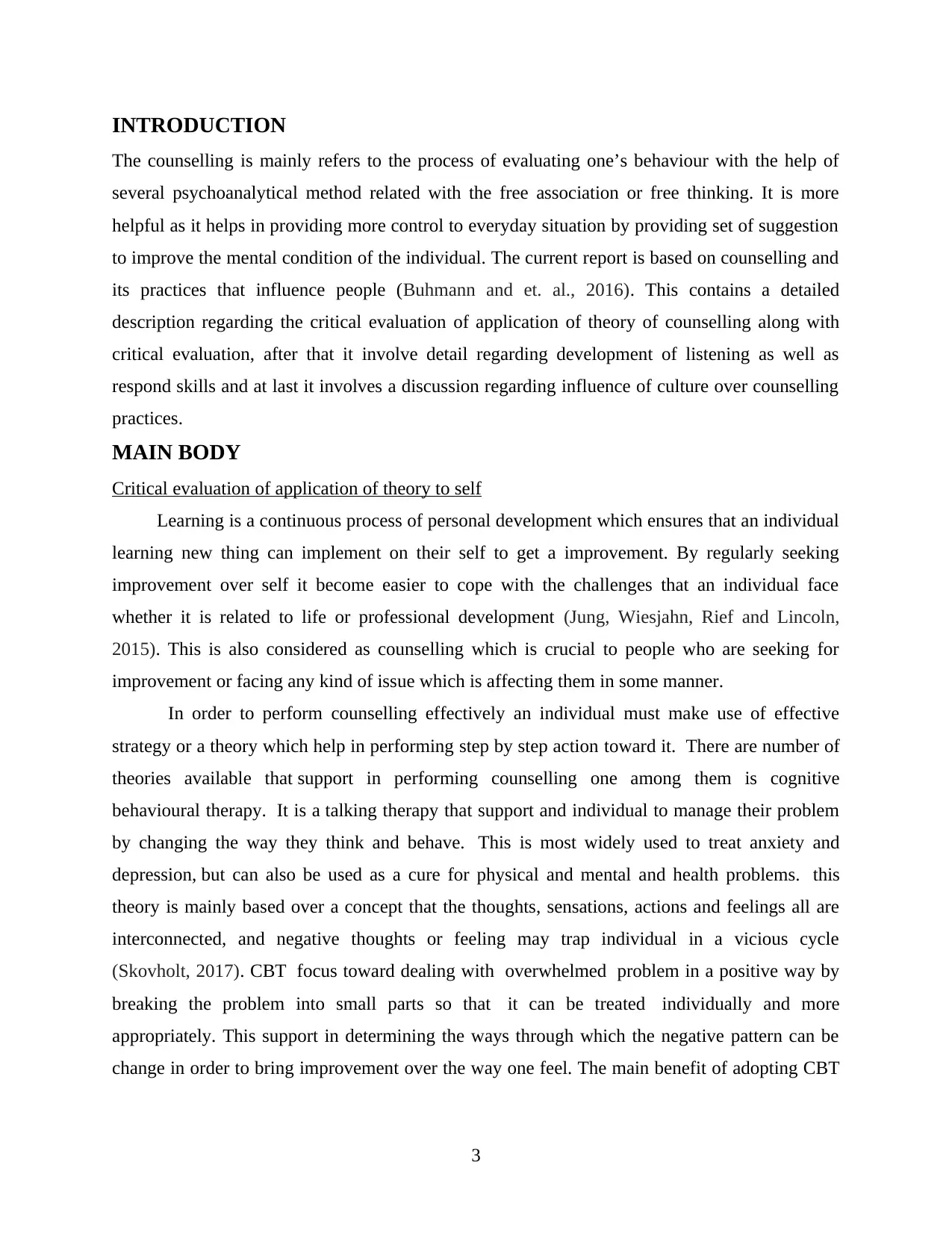
INTRODUCTION
The counselling is mainly refers to the process of evaluating one’s behaviour with the help of
several psychoanalytical method related with the free association or free thinking. It is more
helpful as it helps in providing more control to everyday situation by providing set of suggestion
to improve the mental condition of the individual. The current report is based on counselling and
its practices that influence people (Buhmann and et. al., 2016). This contains a detailed
description regarding the critical evaluation of application of theory of counselling along with
critical evaluation, after that it involve detail regarding development of listening as well as
respond skills and at last it involves a discussion regarding influence of culture over counselling
practices.
MAIN BODY
Critical evaluation of application of theory to self
Learning is a continuous process of personal development which ensures that an individual
learning new thing can implement on their self to get a improvement. By regularly seeking
improvement over self it become easier to cope with the challenges that an individual face
whether it is related to life or professional development (Jung, Wiesjahn, Rief and Lincoln,
2015). This is also considered as counselling which is crucial to people who are seeking for
improvement or facing any kind of issue which is affecting them in some manner.
In order to perform counselling effectively an individual must make use of effective
strategy or a theory which help in performing step by step action toward it. There are number of
theories available that support in performing counselling one among them is cognitive
behavioural therapy. It is a talking therapy that support and individual to manage their problem
by changing the way they think and behave. This is most widely used to treat anxiety and
depression, but can also be used as a cure for physical and mental and health problems. this
theory is mainly based over a concept that the thoughts, sensations, actions and feelings all are
interconnected, and negative thoughts or feeling may trap individual in a vicious cycle
(Skovholt, 2017). CBT focus toward dealing with overwhelmed problem in a positive way by
breaking the problem into small parts so that it can be treated individually and more
appropriately. This support in determining the ways through which the negative pattern can be
change in order to bring improvement over the way one feel. The main benefit of adopting CBT
3
The counselling is mainly refers to the process of evaluating one’s behaviour with the help of
several psychoanalytical method related with the free association or free thinking. It is more
helpful as it helps in providing more control to everyday situation by providing set of suggestion
to improve the mental condition of the individual. The current report is based on counselling and
its practices that influence people (Buhmann and et. al., 2016). This contains a detailed
description regarding the critical evaluation of application of theory of counselling along with
critical evaluation, after that it involve detail regarding development of listening as well as
respond skills and at last it involves a discussion regarding influence of culture over counselling
practices.
MAIN BODY
Critical evaluation of application of theory to self
Learning is a continuous process of personal development which ensures that an individual
learning new thing can implement on their self to get a improvement. By regularly seeking
improvement over self it become easier to cope with the challenges that an individual face
whether it is related to life or professional development (Jung, Wiesjahn, Rief and Lincoln,
2015). This is also considered as counselling which is crucial to people who are seeking for
improvement or facing any kind of issue which is affecting them in some manner.
In order to perform counselling effectively an individual must make use of effective
strategy or a theory which help in performing step by step action toward it. There are number of
theories available that support in performing counselling one among them is cognitive
behavioural therapy. It is a talking therapy that support and individual to manage their problem
by changing the way they think and behave. This is most widely used to treat anxiety and
depression, but can also be used as a cure for physical and mental and health problems. this
theory is mainly based over a concept that the thoughts, sensations, actions and feelings all are
interconnected, and negative thoughts or feeling may trap individual in a vicious cycle
(Skovholt, 2017). CBT focus toward dealing with overwhelmed problem in a positive way by
breaking the problem into small parts so that it can be treated individually and more
appropriately. This support in determining the ways through which the negative pattern can be
change in order to bring improvement over the way one feel. The main benefit of adopting CBT
3
⊘ This is a preview!⊘
Do you want full access?
Subscribe today to unlock all pages.

Trusted by 1+ million students worldwide
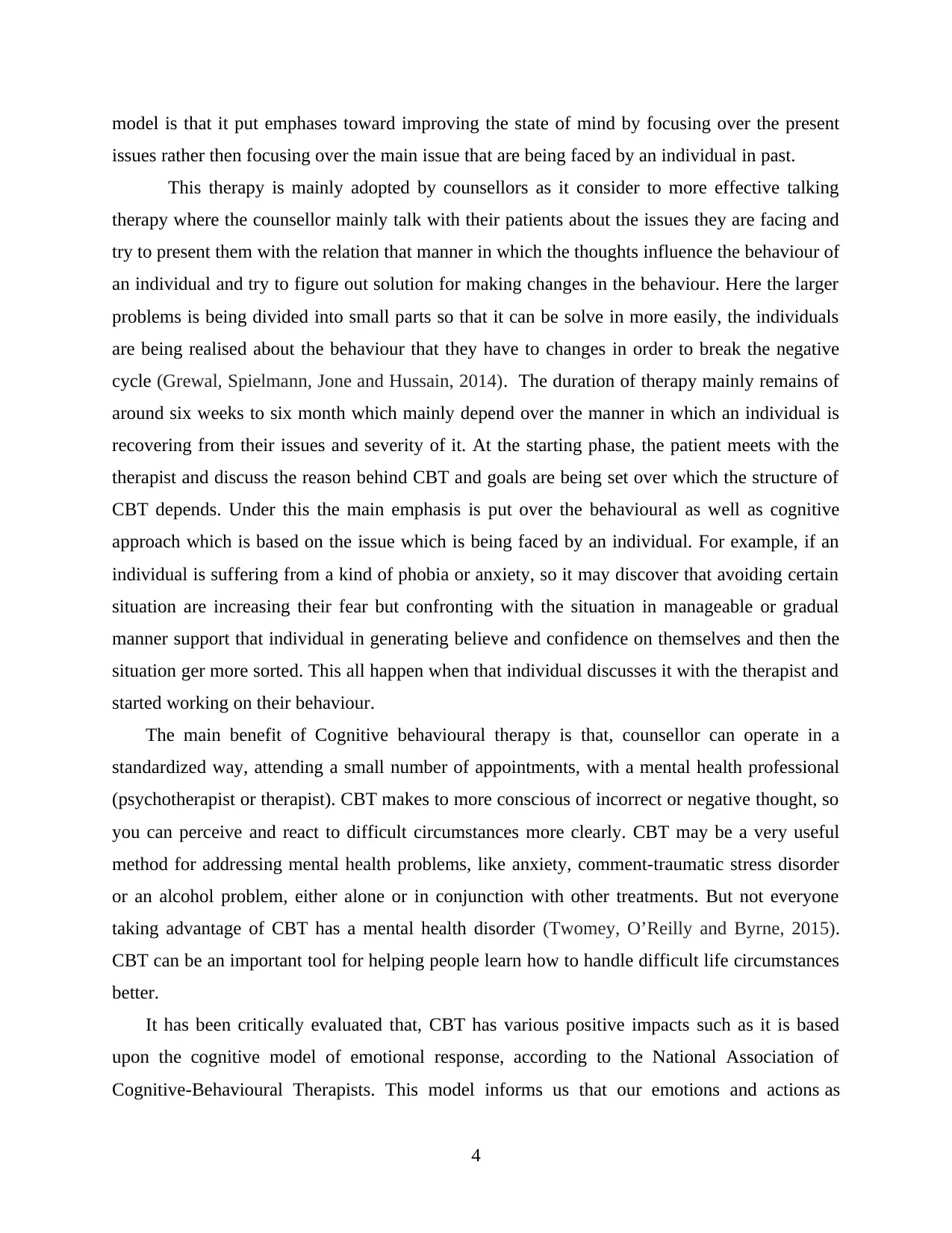
model is that it put emphases toward improving the state of mind by focusing over the present
issues rather then focusing over the main issue that are being faced by an individual in past.
This therapy is mainly adopted by counsellors as it consider to more effective talking
therapy where the counsellor mainly talk with their patients about the issues they are facing and
try to present them with the relation that manner in which the thoughts influence the behaviour of
an individual and try to figure out solution for making changes in the behaviour. Here the larger
problems is being divided into small parts so that it can be solve in more easily, the individuals
are being realised about the behaviour that they have to changes in order to break the negative
cycle (Grewal, Spielmann, Jone and Hussain, 2014). The duration of therapy mainly remains of
around six weeks to six month which mainly depend over the manner in which an individual is
recovering from their issues and severity of it. At the starting phase, the patient meets with the
therapist and discuss the reason behind CBT and goals are being set over which the structure of
CBT depends. Under this the main emphasis is put over the behavioural as well as cognitive
approach which is based on the issue which is being faced by an individual. For example, if an
individual is suffering from a kind of phobia or anxiety, so it may discover that avoiding certain
situation are increasing their fear but confronting with the situation in manageable or gradual
manner support that individual in generating believe and confidence on themselves and then the
situation ger more sorted. This all happen when that individual discusses it with the therapist and
started working on their behaviour.
The main benefit of Cognitive behavioural therapy is that, counsellor can operate in a
standardized way, attending a small number of appointments, with a mental health professional
(psychotherapist or therapist). CBT makes to more conscious of incorrect or negative thought, so
you can perceive and react to difficult circumstances more clearly. CBT may be a very useful
method for addressing mental health problems, like anxiety, comment-traumatic stress disorder
or an alcohol problem, either alone or in conjunction with other treatments. But not everyone
taking advantage of CBT has a mental health disorder (Twomey, O’Reilly and Byrne, 2015).
CBT can be an important tool for helping people learn how to handle difficult life circumstances
better.
It has been critically evaluated that, CBT has various positive impacts such as it is based
upon the cognitive model of emotional response, according to the National Association of
Cognitive-Behavioural Therapists. This model informs us that our emotions and actions as
4
issues rather then focusing over the main issue that are being faced by an individual in past.
This therapy is mainly adopted by counsellors as it consider to more effective talking
therapy where the counsellor mainly talk with their patients about the issues they are facing and
try to present them with the relation that manner in which the thoughts influence the behaviour of
an individual and try to figure out solution for making changes in the behaviour. Here the larger
problems is being divided into small parts so that it can be solve in more easily, the individuals
are being realised about the behaviour that they have to changes in order to break the negative
cycle (Grewal, Spielmann, Jone and Hussain, 2014). The duration of therapy mainly remains of
around six weeks to six month which mainly depend over the manner in which an individual is
recovering from their issues and severity of it. At the starting phase, the patient meets with the
therapist and discuss the reason behind CBT and goals are being set over which the structure of
CBT depends. Under this the main emphasis is put over the behavioural as well as cognitive
approach which is based on the issue which is being faced by an individual. For example, if an
individual is suffering from a kind of phobia or anxiety, so it may discover that avoiding certain
situation are increasing their fear but confronting with the situation in manageable or gradual
manner support that individual in generating believe and confidence on themselves and then the
situation ger more sorted. This all happen when that individual discusses it with the therapist and
started working on their behaviour.
The main benefit of Cognitive behavioural therapy is that, counsellor can operate in a
standardized way, attending a small number of appointments, with a mental health professional
(psychotherapist or therapist). CBT makes to more conscious of incorrect or negative thought, so
you can perceive and react to difficult circumstances more clearly. CBT may be a very useful
method for addressing mental health problems, like anxiety, comment-traumatic stress disorder
or an alcohol problem, either alone or in conjunction with other treatments. But not everyone
taking advantage of CBT has a mental health disorder (Twomey, O’Reilly and Byrne, 2015).
CBT can be an important tool for helping people learn how to handle difficult life circumstances
better.
It has been critically evaluated that, CBT has various positive impacts such as it is based
upon the cognitive model of emotional response, according to the National Association of
Cognitive-Behavioural Therapists. This model informs us that our emotions and actions as
4
Paraphrase This Document
Need a fresh take? Get an instant paraphrase of this document with our AI Paraphraser
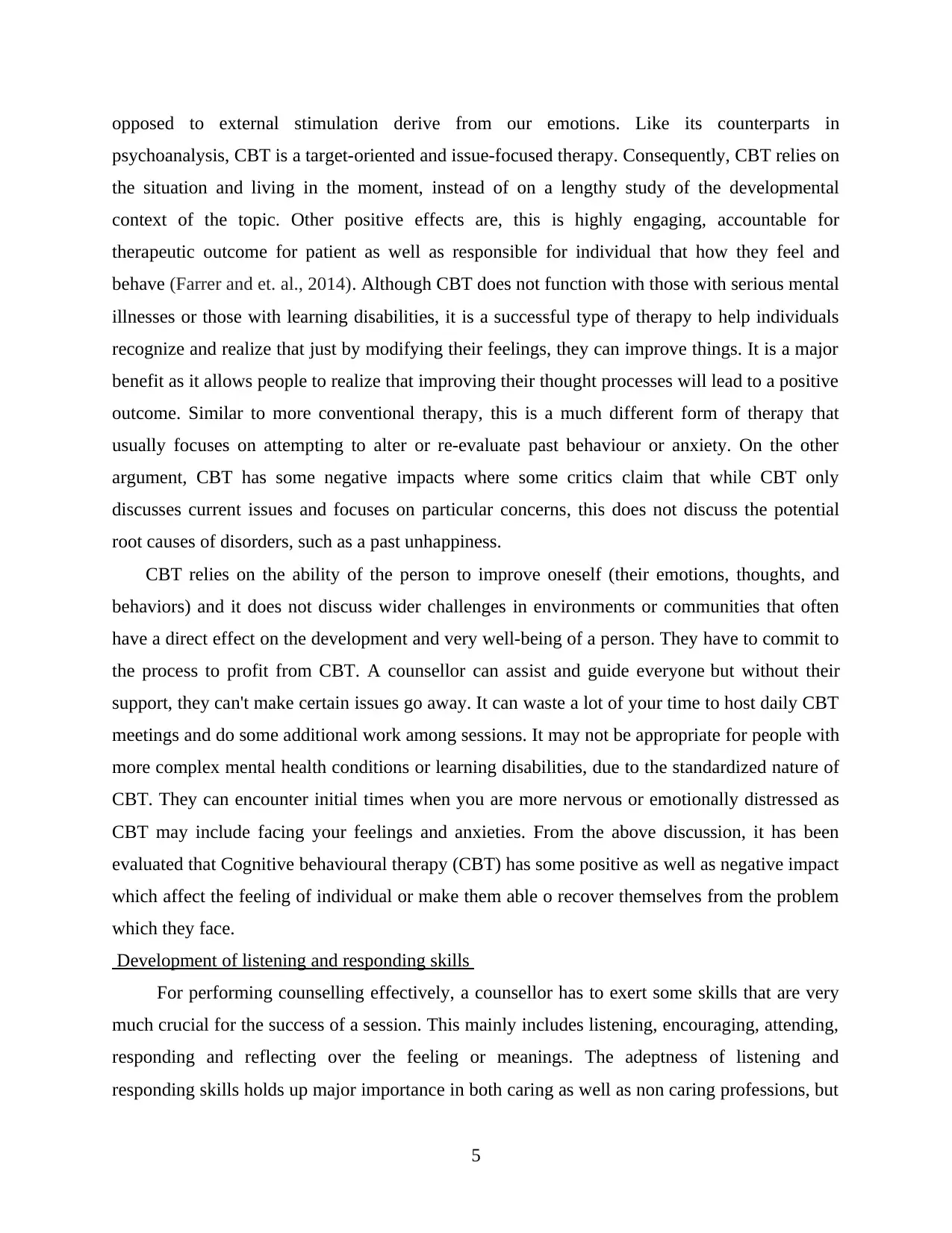
opposed to external stimulation derive from our emotions. Like its counterparts in
psychoanalysis, CBT is a target-oriented and issue-focused therapy. Consequently, CBT relies on
the situation and living in the moment, instead of on a lengthy study of the developmental
context of the topic. Other positive effects are, this is highly engaging, accountable for
therapeutic outcome for patient as well as responsible for individual that how they feel and
behave (Farrer and et. al., 2014). Although CBT does not function with those with serious mental
illnesses or those with learning disabilities, it is a successful type of therapy to help individuals
recognize and realize that just by modifying their feelings, they can improve things. It is a major
benefit as it allows people to realize that improving their thought processes will lead to a positive
outcome. Similar to more conventional therapy, this is a much different form of therapy that
usually focuses on attempting to alter or re-evaluate past behaviour or anxiety. On the other
argument, CBT has some negative impacts where some critics claim that while CBT only
discusses current issues and focuses on particular concerns, this does not discuss the potential
root causes of disorders, such as a past unhappiness.
CBT relies on the ability of the person to improve oneself (their emotions, thoughts, and
behaviors) and it does not discuss wider challenges in environments or communities that often
have a direct effect on the development and very well-being of a person. They have to commit to
the process to profit from CBT. A counsellor can assist and guide everyone but without their
support, they can't make certain issues go away. It can waste a lot of your time to host daily CBT
meetings and do some additional work among sessions. It may not be appropriate for people with
more complex mental health conditions or learning disabilities, due to the standardized nature of
CBT. They can encounter initial times when you are more nervous or emotionally distressed as
CBT may include facing your feelings and anxieties. From the above discussion, it has been
evaluated that Cognitive behavioural therapy (CBT) has some positive as well as negative impact
which affect the feeling of individual or make them able o recover themselves from the problem
which they face.
Development of listening and responding skills
For performing counselling effectively, a counsellor has to exert some skills that are very
much crucial for the success of a session. This mainly includes listening, encouraging, attending,
responding and reflecting over the feeling or meanings. The adeptness of listening and
responding skills holds up major importance in both caring as well as non caring professions, but
5
psychoanalysis, CBT is a target-oriented and issue-focused therapy. Consequently, CBT relies on
the situation and living in the moment, instead of on a lengthy study of the developmental
context of the topic. Other positive effects are, this is highly engaging, accountable for
therapeutic outcome for patient as well as responsible for individual that how they feel and
behave (Farrer and et. al., 2014). Although CBT does not function with those with serious mental
illnesses or those with learning disabilities, it is a successful type of therapy to help individuals
recognize and realize that just by modifying their feelings, they can improve things. It is a major
benefit as it allows people to realize that improving their thought processes will lead to a positive
outcome. Similar to more conventional therapy, this is a much different form of therapy that
usually focuses on attempting to alter or re-evaluate past behaviour or anxiety. On the other
argument, CBT has some negative impacts where some critics claim that while CBT only
discusses current issues and focuses on particular concerns, this does not discuss the potential
root causes of disorders, such as a past unhappiness.
CBT relies on the ability of the person to improve oneself (their emotions, thoughts, and
behaviors) and it does not discuss wider challenges in environments or communities that often
have a direct effect on the development and very well-being of a person. They have to commit to
the process to profit from CBT. A counsellor can assist and guide everyone but without their
support, they can't make certain issues go away. It can waste a lot of your time to host daily CBT
meetings and do some additional work among sessions. It may not be appropriate for people with
more complex mental health conditions or learning disabilities, due to the standardized nature of
CBT. They can encounter initial times when you are more nervous or emotionally distressed as
CBT may include facing your feelings and anxieties. From the above discussion, it has been
evaluated that Cognitive behavioural therapy (CBT) has some positive as well as negative impact
which affect the feeling of individual or make them able o recover themselves from the problem
which they face.
Development of listening and responding skills
For performing counselling effectively, a counsellor has to exert some skills that are very
much crucial for the success of a session. This mainly includes listening, encouraging, attending,
responding and reflecting over the feeling or meanings. The adeptness of listening and
responding skills holds up major importance in both caring as well as non caring professions, but
5
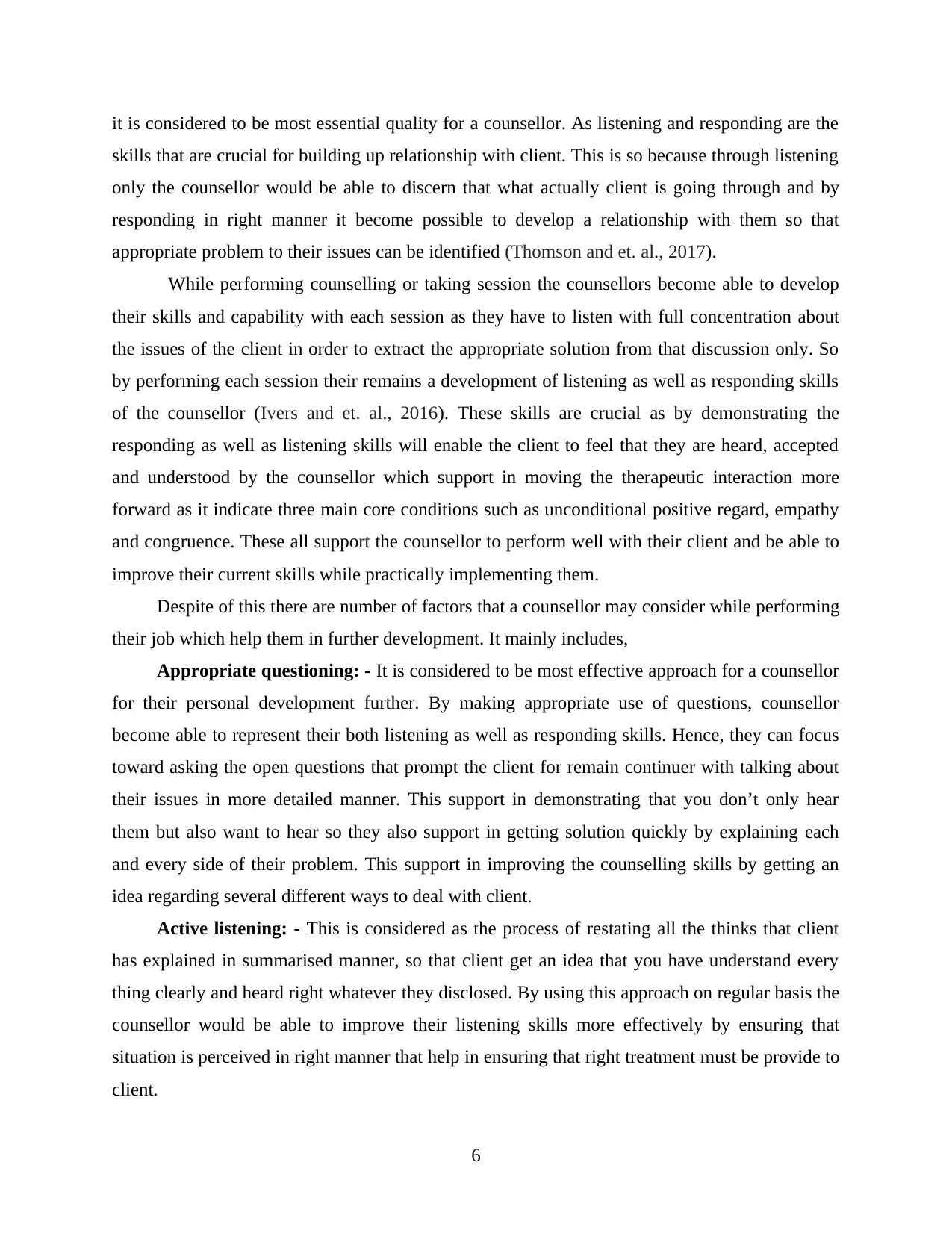
it is considered to be most essential quality for a counsellor. As listening and responding are the
skills that are crucial for building up relationship with client. This is so because through listening
only the counsellor would be able to discern that what actually client is going through and by
responding in right manner it become possible to develop a relationship with them so that
appropriate problem to their issues can be identified (Thomson and et. al., 2017).
While performing counselling or taking session the counsellors become able to develop
their skills and capability with each session as they have to listen with full concentration about
the issues of the client in order to extract the appropriate solution from that discussion only. So
by performing each session their remains a development of listening as well as responding skills
of the counsellor (Ivers and et. al., 2016). These skills are crucial as by demonstrating the
responding as well as listening skills will enable the client to feel that they are heard, accepted
and understood by the counsellor which support in moving the therapeutic interaction more
forward as it indicate three main core conditions such as unconditional positive regard, empathy
and congruence. These all support the counsellor to perform well with their client and be able to
improve their current skills while practically implementing them.
Despite of this there are number of factors that a counsellor may consider while performing
their job which help them in further development. It mainly includes,
Appropriate questioning: - It is considered to be most effective approach for a counsellor
for their personal development further. By making appropriate use of questions, counsellor
become able to represent their both listening as well as responding skills. Hence, they can focus
toward asking the open questions that prompt the client for remain continuer with talking about
their issues in more detailed manner. This support in demonstrating that you don’t only hear
them but also want to hear so they also support in getting solution quickly by explaining each
and every side of their problem. This support in improving the counselling skills by getting an
idea regarding several different ways to deal with client.
Active listening: - This is considered as the process of restating all the thinks that client
has explained in summarised manner, so that client get an idea that you have understand every
thing clearly and heard right whatever they disclosed. By using this approach on regular basis the
counsellor would be able to improve their listening skills more effectively by ensuring that
situation is perceived in right manner that help in ensuring that right treatment must be provide to
client.
6
skills that are crucial for building up relationship with client. This is so because through listening
only the counsellor would be able to discern that what actually client is going through and by
responding in right manner it become possible to develop a relationship with them so that
appropriate problem to their issues can be identified (Thomson and et. al., 2017).
While performing counselling or taking session the counsellors become able to develop
their skills and capability with each session as they have to listen with full concentration about
the issues of the client in order to extract the appropriate solution from that discussion only. So
by performing each session their remains a development of listening as well as responding skills
of the counsellor (Ivers and et. al., 2016). These skills are crucial as by demonstrating the
responding as well as listening skills will enable the client to feel that they are heard, accepted
and understood by the counsellor which support in moving the therapeutic interaction more
forward as it indicate three main core conditions such as unconditional positive regard, empathy
and congruence. These all support the counsellor to perform well with their client and be able to
improve their current skills while practically implementing them.
Despite of this there are number of factors that a counsellor may consider while performing
their job which help them in further development. It mainly includes,
Appropriate questioning: - It is considered to be most effective approach for a counsellor
for their personal development further. By making appropriate use of questions, counsellor
become able to represent their both listening as well as responding skills. Hence, they can focus
toward asking the open questions that prompt the client for remain continuer with talking about
their issues in more detailed manner. This support in demonstrating that you don’t only hear
them but also want to hear so they also support in getting solution quickly by explaining each
and every side of their problem. This support in improving the counselling skills by getting an
idea regarding several different ways to deal with client.
Active listening: - This is considered as the process of restating all the thinks that client
has explained in summarised manner, so that client get an idea that you have understand every
thing clearly and heard right whatever they disclosed. By using this approach on regular basis the
counsellor would be able to improve their listening skills more effectively by ensuring that
situation is perceived in right manner that help in ensuring that right treatment must be provide to
client.
6
⊘ This is a preview!⊘
Do you want full access?
Subscribe today to unlock all pages.

Trusted by 1+ million students worldwide
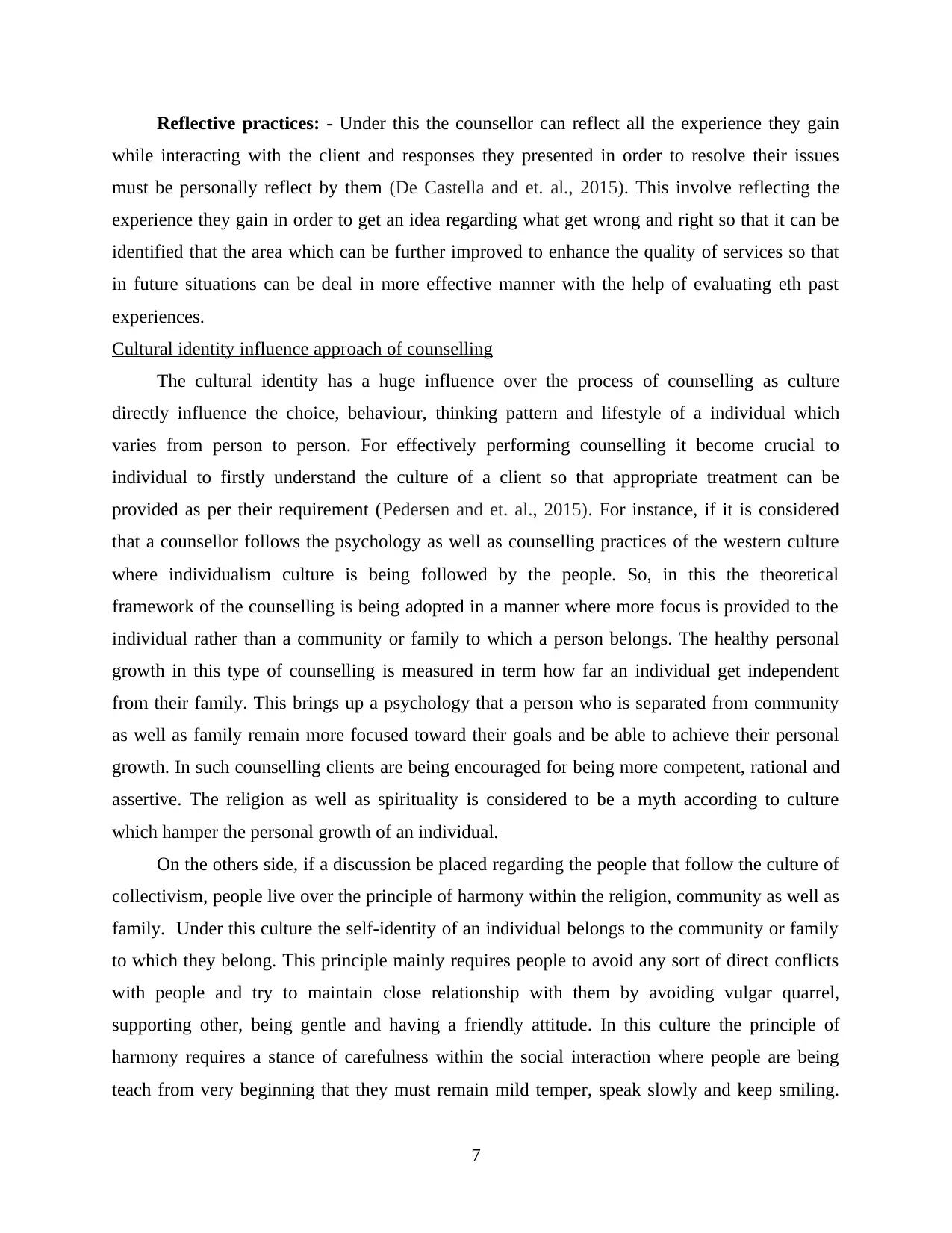
Reflective practices: - Under this the counsellor can reflect all the experience they gain
while interacting with the client and responses they presented in order to resolve their issues
must be personally reflect by them (De Castella and et. al., 2015). This involve reflecting the
experience they gain in order to get an idea regarding what get wrong and right so that it can be
identified that the area which can be further improved to enhance the quality of services so that
in future situations can be deal in more effective manner with the help of evaluating eth past
experiences.
Cultural identity influence approach of counselling
The cultural identity has a huge influence over the process of counselling as culture
directly influence the choice, behaviour, thinking pattern and lifestyle of a individual which
varies from person to person. For effectively performing counselling it become crucial to
individual to firstly understand the culture of a client so that appropriate treatment can be
provided as per their requirement (Pedersen and et. al., 2015). For instance, if it is considered
that a counsellor follows the psychology as well as counselling practices of the western culture
where individualism culture is being followed by the people. So, in this the theoretical
framework of the counselling is being adopted in a manner where more focus is provided to the
individual rather than a community or family to which a person belongs. The healthy personal
growth in this type of counselling is measured in term how far an individual get independent
from their family. This brings up a psychology that a person who is separated from community
as well as family remain more focused toward their goals and be able to achieve their personal
growth. In such counselling clients are being encouraged for being more competent, rational and
assertive. The religion as well as spirituality is considered to be a myth according to culture
which hamper the personal growth of an individual.
On the others side, if a discussion be placed regarding the people that follow the culture of
collectivism, people live over the principle of harmony within the religion, community as well as
family. Under this culture the self-identity of an individual belongs to the community or family
to which they belong. This principle mainly requires people to avoid any sort of direct conflicts
with people and try to maintain close relationship with them by avoiding vulgar quarrel,
supporting other, being gentle and having a friendly attitude. In this culture the principle of
harmony requires a stance of carefulness within the social interaction where people are being
teach from very beginning that they must remain mild temper, speak slowly and keep smiling.
7
while interacting with the client and responses they presented in order to resolve their issues
must be personally reflect by them (De Castella and et. al., 2015). This involve reflecting the
experience they gain in order to get an idea regarding what get wrong and right so that it can be
identified that the area which can be further improved to enhance the quality of services so that
in future situations can be deal in more effective manner with the help of evaluating eth past
experiences.
Cultural identity influence approach of counselling
The cultural identity has a huge influence over the process of counselling as culture
directly influence the choice, behaviour, thinking pattern and lifestyle of a individual which
varies from person to person. For effectively performing counselling it become crucial to
individual to firstly understand the culture of a client so that appropriate treatment can be
provided as per their requirement (Pedersen and et. al., 2015). For instance, if it is considered
that a counsellor follows the psychology as well as counselling practices of the western culture
where individualism culture is being followed by the people. So, in this the theoretical
framework of the counselling is being adopted in a manner where more focus is provided to the
individual rather than a community or family to which a person belongs. The healthy personal
growth in this type of counselling is measured in term how far an individual get independent
from their family. This brings up a psychology that a person who is separated from community
as well as family remain more focused toward their goals and be able to achieve their personal
growth. In such counselling clients are being encouraged for being more competent, rational and
assertive. The religion as well as spirituality is considered to be a myth according to culture
which hamper the personal growth of an individual.
On the others side, if a discussion be placed regarding the people that follow the culture of
collectivism, people live over the principle of harmony within the religion, community as well as
family. Under this culture the self-identity of an individual belongs to the community or family
to which they belong. This principle mainly requires people to avoid any sort of direct conflicts
with people and try to maintain close relationship with them by avoiding vulgar quarrel,
supporting other, being gentle and having a friendly attitude. In this culture the principle of
harmony requires a stance of carefulness within the social interaction where people are being
teach from very beginning that they must remain mild temper, speak slowly and keep smiling.
7
Paraphrase This Document
Need a fresh take? Get an instant paraphrase of this document with our AI Paraphraser
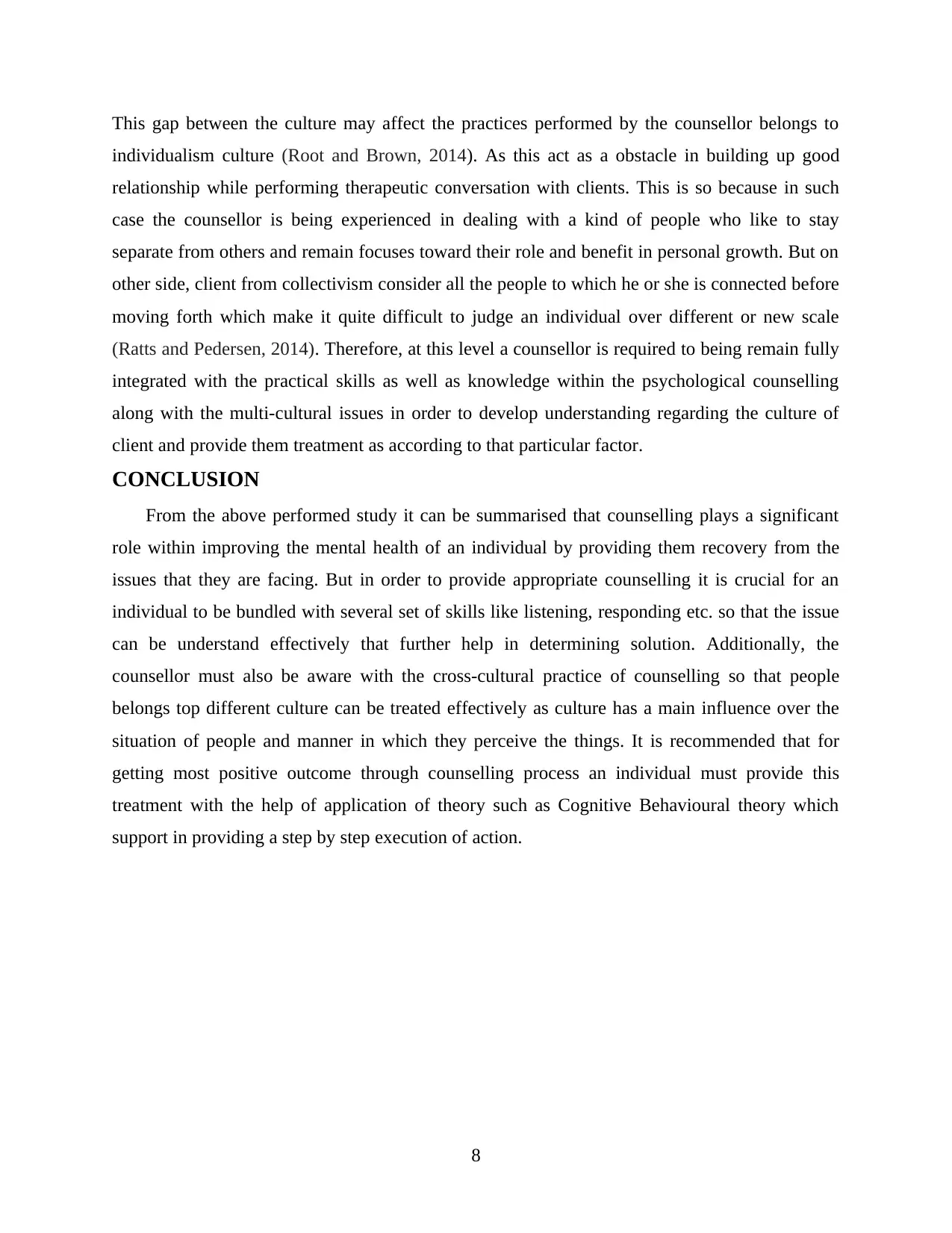
This gap between the culture may affect the practices performed by the counsellor belongs to
individualism culture (Root and Brown, 2014). As this act as a obstacle in building up good
relationship while performing therapeutic conversation with clients. This is so because in such
case the counsellor is being experienced in dealing with a kind of people who like to stay
separate from others and remain focuses toward their role and benefit in personal growth. But on
other side, client from collectivism consider all the people to which he or she is connected before
moving forth which make it quite difficult to judge an individual over different or new scale
(Ratts and Pedersen, 2014). Therefore, at this level a counsellor is required to being remain fully
integrated with the practical skills as well as knowledge within the psychological counselling
along with the multi-cultural issues in order to develop understanding regarding the culture of
client and provide them treatment as according to that particular factor.
CONCLUSION
From the above performed study it can be summarised that counselling plays a significant
role within improving the mental health of an individual by providing them recovery from the
issues that they are facing. But in order to provide appropriate counselling it is crucial for an
individual to be bundled with several set of skills like listening, responding etc. so that the issue
can be understand effectively that further help in determining solution. Additionally, the
counsellor must also be aware with the cross-cultural practice of counselling so that people
belongs top different culture can be treated effectively as culture has a main influence over the
situation of people and manner in which they perceive the things. It is recommended that for
getting most positive outcome through counselling process an individual must provide this
treatment with the help of application of theory such as Cognitive Behavioural theory which
support in providing a step by step execution of action.
8
individualism culture (Root and Brown, 2014). As this act as a obstacle in building up good
relationship while performing therapeutic conversation with clients. This is so because in such
case the counsellor is being experienced in dealing with a kind of people who like to stay
separate from others and remain focuses toward their role and benefit in personal growth. But on
other side, client from collectivism consider all the people to which he or she is connected before
moving forth which make it quite difficult to judge an individual over different or new scale
(Ratts and Pedersen, 2014). Therefore, at this level a counsellor is required to being remain fully
integrated with the practical skills as well as knowledge within the psychological counselling
along with the multi-cultural issues in order to develop understanding regarding the culture of
client and provide them treatment as according to that particular factor.
CONCLUSION
From the above performed study it can be summarised that counselling plays a significant
role within improving the mental health of an individual by providing them recovery from the
issues that they are facing. But in order to provide appropriate counselling it is crucial for an
individual to be bundled with several set of skills like listening, responding etc. so that the issue
can be understand effectively that further help in determining solution. Additionally, the
counsellor must also be aware with the cross-cultural practice of counselling so that people
belongs top different culture can be treated effectively as culture has a main influence over the
situation of people and manner in which they perceive the things. It is recommended that for
getting most positive outcome through counselling process an individual must provide this
treatment with the help of application of theory such as Cognitive Behavioural theory which
support in providing a step by step execution of action.
8
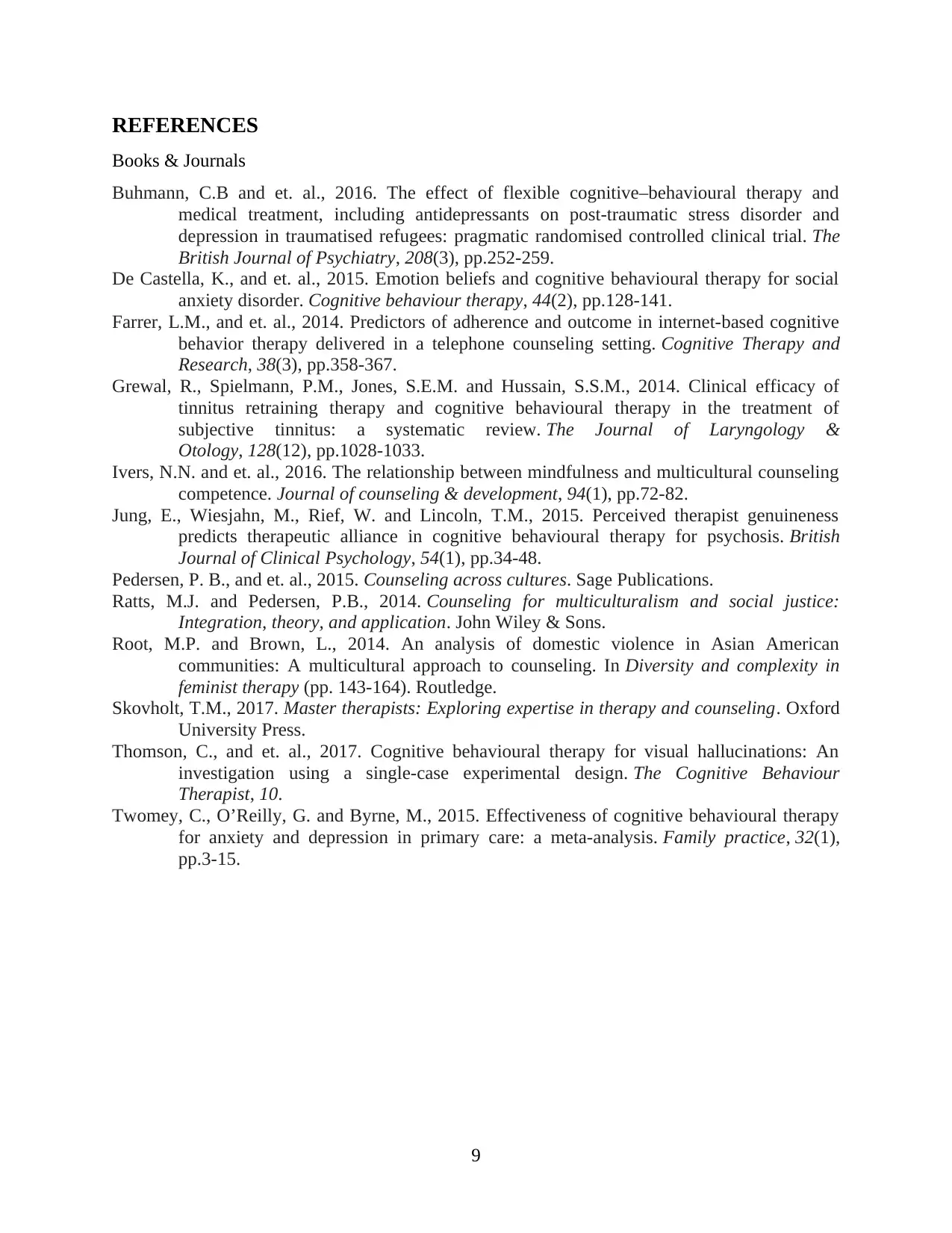
REFERENCES
Books & Journals
Buhmann, C.B and et. al., 2016. The effect of flexible cognitive–behavioural therapy and
medical treatment, including antidepressants on post-traumatic stress disorder and
depression in traumatised refugees: pragmatic randomised controlled clinical trial. The
British Journal of Psychiatry, 208(3), pp.252-259.
De Castella, K., and et. al., 2015. Emotion beliefs and cognitive behavioural therapy for social
anxiety disorder. Cognitive behaviour therapy, 44(2), pp.128-141.
Farrer, L.M., and et. al., 2014. Predictors of adherence and outcome in internet-based cognitive
behavior therapy delivered in a telephone counseling setting. Cognitive Therapy and
Research, 38(3), pp.358-367.
Grewal, R., Spielmann, P.M., Jones, S.E.M. and Hussain, S.S.M., 2014. Clinical efficacy of
tinnitus retraining therapy and cognitive behavioural therapy in the treatment of
subjective tinnitus: a systematic review. The Journal of Laryngology &
Otology, 128(12), pp.1028-1033.
Ivers, N.N. and et. al., 2016. The relationship between mindfulness and multicultural counseling
competence. Journal of counseling & development, 94(1), pp.72-82.
Jung, E., Wiesjahn, M., Rief, W. and Lincoln, T.M., 2015. Perceived therapist genuineness
predicts therapeutic alliance in cognitive behavioural therapy for psychosis. British
Journal of Clinical Psychology, 54(1), pp.34-48.
Pedersen, P. B., and et. al., 2015. Counseling across cultures. Sage Publications.
Ratts, M.J. and Pedersen, P.B., 2014. Counseling for multiculturalism and social justice:
Integration, theory, and application. John Wiley & Sons.
Root, M.P. and Brown, L., 2014. An analysis of domestic violence in Asian American
communities: A multicultural approach to counseling. In Diversity and complexity in
feminist therapy (pp. 143-164). Routledge.
Skovholt, T.M., 2017. Master therapists: Exploring expertise in therapy and counseling. Oxford
University Press.
Thomson, C., and et. al., 2017. Cognitive behavioural therapy for visual hallucinations: An
investigation using a single-case experimental design. The Cognitive Behaviour
Therapist, 10.
Twomey, C., O’Reilly, G. and Byrne, M., 2015. Effectiveness of cognitive behavioural therapy
for anxiety and depression in primary care: a meta-analysis. Family practice, 32(1),
pp.3-15.
9
Books & Journals
Buhmann, C.B and et. al., 2016. The effect of flexible cognitive–behavioural therapy and
medical treatment, including antidepressants on post-traumatic stress disorder and
depression in traumatised refugees: pragmatic randomised controlled clinical trial. The
British Journal of Psychiatry, 208(3), pp.252-259.
De Castella, K., and et. al., 2015. Emotion beliefs and cognitive behavioural therapy for social
anxiety disorder. Cognitive behaviour therapy, 44(2), pp.128-141.
Farrer, L.M., and et. al., 2014. Predictors of adherence and outcome in internet-based cognitive
behavior therapy delivered in a telephone counseling setting. Cognitive Therapy and
Research, 38(3), pp.358-367.
Grewal, R., Spielmann, P.M., Jones, S.E.M. and Hussain, S.S.M., 2014. Clinical efficacy of
tinnitus retraining therapy and cognitive behavioural therapy in the treatment of
subjective tinnitus: a systematic review. The Journal of Laryngology &
Otology, 128(12), pp.1028-1033.
Ivers, N.N. and et. al., 2016. The relationship between mindfulness and multicultural counseling
competence. Journal of counseling & development, 94(1), pp.72-82.
Jung, E., Wiesjahn, M., Rief, W. and Lincoln, T.M., 2015. Perceived therapist genuineness
predicts therapeutic alliance in cognitive behavioural therapy for psychosis. British
Journal of Clinical Psychology, 54(1), pp.34-48.
Pedersen, P. B., and et. al., 2015. Counseling across cultures. Sage Publications.
Ratts, M.J. and Pedersen, P.B., 2014. Counseling for multiculturalism and social justice:
Integration, theory, and application. John Wiley & Sons.
Root, M.P. and Brown, L., 2014. An analysis of domestic violence in Asian American
communities: A multicultural approach to counseling. In Diversity and complexity in
feminist therapy (pp. 143-164). Routledge.
Skovholt, T.M., 2017. Master therapists: Exploring expertise in therapy and counseling. Oxford
University Press.
Thomson, C., and et. al., 2017. Cognitive behavioural therapy for visual hallucinations: An
investigation using a single-case experimental design. The Cognitive Behaviour
Therapist, 10.
Twomey, C., O’Reilly, G. and Byrne, M., 2015. Effectiveness of cognitive behavioural therapy
for anxiety and depression in primary care: a meta-analysis. Family practice, 32(1),
pp.3-15.
9
⊘ This is a preview!⊘
Do you want full access?
Subscribe today to unlock all pages.

Trusted by 1+ million students worldwide
1 out of 9
Related Documents
Your All-in-One AI-Powered Toolkit for Academic Success.
+13062052269
info@desklib.com
Available 24*7 on WhatsApp / Email
![[object Object]](/_next/static/media/star-bottom.7253800d.svg)
Unlock your academic potential
Copyright © 2020–2026 A2Z Services. All Rights Reserved. Developed and managed by ZUCOL.





